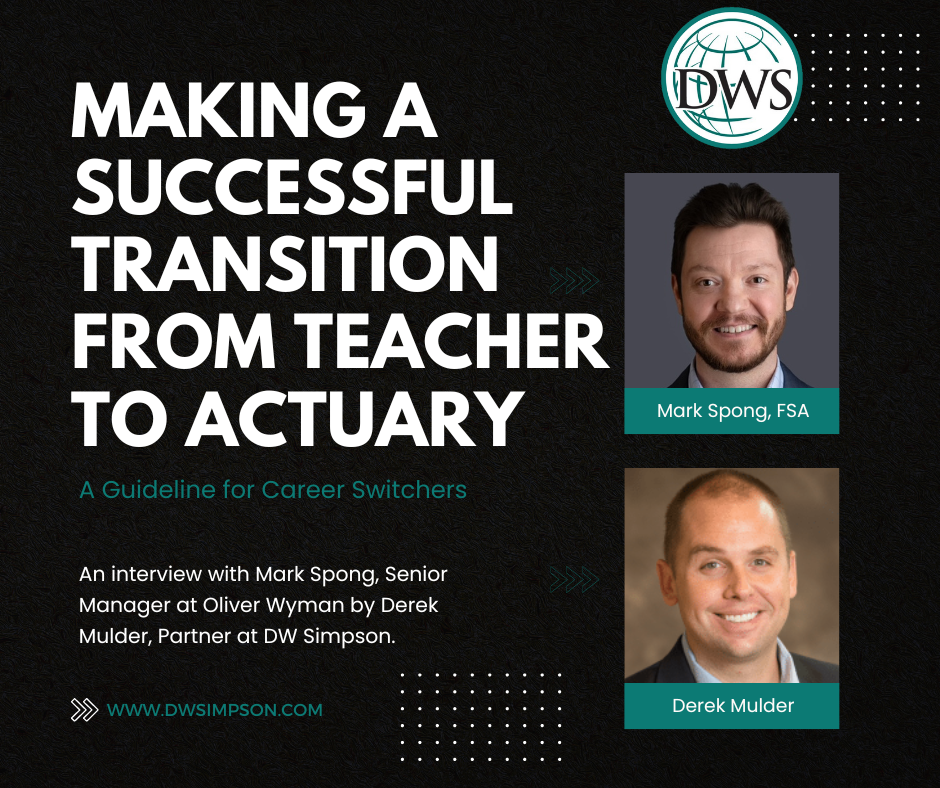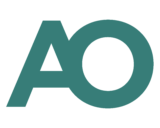Home › Forums › Actuarial Resources & Blogs › MAKING A SUCCESSFUL TRANSITION FROM TEACHER TO ACTUARY
Tagged: Academia, Actuarial. Teacher, actuary, blog, Career, Career Switcher, challenges, exams, FSA, Interview, Networks, Resources
- This topic has 0 replies, 1 voice, and was last updated 8 months, 3 weeks ago by
admin.
-
AuthorPosts
-
August 8, 2023 at 3:41 pm #24385
 A GUIDELINE FOR CAREER SWITCHERS
A GUIDELINE FOR CAREER SWITCHERSDerek: What made you want to be an actuary after first being a teacher?
Mark: Since first starting the transition from teacher to actuary, this has been the #1 question that I’ve been asked by interviewers, recruiters, managers, and friends. I strongly advise having a polished and organized response to this question early on that you can tailor to your audience, that lets your personality, priorities, and character shine through.
I always structure my response as two parts, ‘Push’ reasons and ‘Pull‘ reasons, because it helps me tell a balanced story. Push reasons include why I felt ready to move on from teaching:
- I accomplished some big goals as a teacher that I had set for myself, including a 100% college acceptance for my mentor group of seniors, having my own student teacher from Stanford, and authoring a textbook. I was ready for something new.
- Note that the key to this reason is that I want to demonstrate that I was an effective teacher and threw my heart and soul into it. The message here is that I’m not running away from anything; rather I achieved some significant milestones and I’m ready to be successful in the next arena.
- I needed a more direct relationship between my effort and success. As a teacher, I believed that if my students didn’t learn something then I didn’t teach it properly. This philosophical stance put extraordinary pressure on me to reach every kid and I measured my success based on how well they did. It made me very invested and effective, but it also tore me up when they failed.
- This reason helps to elicit empathy with a listener because it is a very relatable story and allows me to transition to the pull reasons seamlessly.
Pull reasons include why I felt drawn to actuarial work:
- I was attracted to the fact that actuarial exams are an objective opportunity for advancement. If I study hard for a math exam and pass, then I’ll get a substantial raise? Sign me up!
- In terms of storytelling, this is a striking point because I’ve basically made a convincing argument about what is arguably the single worst part of being an actuary and why it is attractive to someone like me.
- I felt that I could bring more of my “whole self” to work as an actuary than as a teacher. As a teacher, my ability to build trust and have patience was extremely important. However, there were other aspects of my personality that teaching was not a particularly good outlet for. I’m a competitive and ambitious person, and I didn’t find those traits to be effective in my classroom. I believed that as an actuary, I could bring more of myself to my professional life.
- This response is great because it highlights positives about teaching while simultaneously bringing up some nuances that showcase why I’ll be a successful actuary. I can swap out ‘competitive and ambitious’ for other parts of my character, for example my interest in research, which I also couldn’t fit into my classroom.
There are some reasons for making the switch from teacher to actuary that you need to be careful about. I choose not to bring these up:
- Anything bad about the teaching profession
- Saying teaching wasn’t challenging intellectually insults other teachers and discounts the intellectual challenge of pedagogy. Badmouthing parents or administrators makes it seem you can’t operate effectively within a setting with multiple stakeholders.
- Incidents of violence
- Getting away from a traumatic experience is a legitimate reason, however I try to carefully gauge my audience and the impression I’d like to make and be very selective when I share this type of personal detail.
Additionally, I don’t give either of the following as reasons for making the switch from teacher to actuary:
- “I just wanted to make more money.”
- This is an extremely low effort answer which sends signals of greed. There are better ways to convey this idea.
- “I wanted to catch up to my peers from undergrad.”
- This reason is extremely poor because it means teaching was a mistake (which it wasn’t) and gives off an impression of self-entitlement and envy.
The key to a solid response is to be thoughtful and genuine. I think we should all be proud of our teaching background and try to capitalize on it as a strength. I highly recommend taking the time now to think through how you would respond to this question.
Derek: What is the best way to get started?
Mark: Here are a few actionable suggestions:
- Study and take exam P or FM. It is an incredibly good use of time for a few reasons:
- You’ll learn if you enjoy the math and can tolerate the studying – The thought of spending 10-20 hours every week for 6+ months a year for 5+ years may be a lifestyle trade-off you aren’t willing to make.
- You’ll learn how hard the exams really are – In my experience folks with an undergraduate degree in math or something similar are definitely capable of passing. I’ve taught high school students who could pass. In fact, the Actuarial Bootcamp (https://www.connecticutifs.com/actuarialbootcamp/) is a one-week program for high school students and college freshman designed to prep for the first exam and many attendees pass. However, your experience is unique and other people saying the exams are hard or passable isn’t useful information. Once you take an exam and actually pass, you’ll truly know and have the confidence that you can do it.
- You can’t get an internship or an entry level role without a few exams, so you might as well start getting them out of the way if you are thinking about transitioning at some point.
- It is by far the best professional development I did as a teacher. I had to become a student again and learned and applied all sorts of skills which I immediately started using in my teaching. Everything from test taking strategies to slogging through homework, to new types of questions/proofs and extension work. It made me a better teacher.
- Talk to an actuary. If you know someone who is an actuary, spend some time picking their brain. If you don’t know anyone, find someone on LinkedIn or contact an author of an actuarial article and ask to connect. I’ve had a number of people reach out to me over the years and I’m happy to be a mentor (just find me on LinkedIn or email me at spong@oliverwyman.com).
- Prepare and plan for landing the first job or internship. Most actuarial development programs have an entry level recruiting season that starts in September and ends in November. Figure out where you’d want to apply, prepare that resume, and start networking so that you get included in the queue. I almost missed this window and was extremely lucky to get an actuarial internship later in the year.
Derek: Are there any specific resources that you used to make the transition that you found helpful? Are there any groups, networks, resources or conference sessions dedicated to why teachers make great actuaries?
Mark: I went back to graduate school at UConn to help me make the transition. I know it isn’t right for everyone, but it helped me get a few more exams, land my first internship and first full-time actuarial role through the actuarial career fair. The network I built at UCONN helped me connect with both my second and third employers. If you can get your foot in the door without graduate school, that would be great, but for me it was invaluable.
If graduate school isn’t in the cards for you then I’ve seen others be successful going to a Candidate Connect conference from the SOA. There are lots of career switchers at that conference and the presenters and company sponsors are all looking to hire talent. I’ve hired at least one teacher from those conferences.
The International Association of Black Actuaries also hosts a conference every year and I’ve never been to a conference more welcoming and supportive of young people of color looking to become actuaries. Recruiters are also in heavy attendance.
There are local actuarial clubs that have conferences one or two times a year. The cost is relatively modest and if you happen to be local to one, it may be worth attending just to learn more. For example, the Actuarial Club of Hartford and Springfield is a great local club with 300-500 people attending each fall and spring conference.
LinkedIn is also very useful. There is always at least one person in charge of recruiting actuarial talent at most companies that hire actuaries. You just need to get your information in front of them.
I always liked to use http://www.actuarial-lookup.com/ which allows you to see the exam passes for people you search for. It helped me see exam journeys realistically.
Derek: What was the most difficult part, or what are some challenges, of moving out of academia and into an actuarial role?
Mark: I didn’t know Excel, VBA, or R like my peers did. I read a book on VBA, learned Excel on the job, and scrapped by with enough R to work with people who use it properly.
Starting out at the bottom was tough emotionally. My peers were the same ages as my former students. On the plus side, it helped me stand out in many ways.
Feeling ‘behind’ in exams was tough. Solid advice I heard early on was ‘it is a marathon not a sprint.’ Most people fail at least one. Just study like mad and pass it the next time.
Landing that first job is really the primary challenge. Once you have that, you do a good job, and you learn some transferable skills, then there are tons of opportunities out there.
Sometimes you’ll miss teaching, particularly when you feel underqualified at your actuarial job. You’ll miss the feeling of being comfortable with all the technical details. However, that just means you are on the steepest part of the learning curve which can be a good thing.
You might feel like you are selling out or giving up on the noble profession you once idealized. I’d advise reframing this because you may be telling yourself a story that isn’t entirely true. There are plenty of opportunities to pursue social justice through Diversity, Equity and Inclusion initiatives through your employer or volunteer activities. When I was teaching, I observed first-hand a direct relationship between affluence and successful educational outcomes. As an actuary, I’ve discovered I enjoy mortality research, and I have been able to investigate and publish a prominent research paper on the growing ‘longevity gap’ between the rich and poor. In addition, I recently chaired a different SOA research project on violent causes of death by race/ethnicity. The punchline is that teaching doesn’t have a monopoly on contributing to the public good and you can find a different path that is just as satisfying.
By Derek Mulder, Partner at DW Simpson and Mark Spong, Senior Manager at Oliver Wyman
- I accomplished some big goals as a teacher that I had set for myself, including a 100% college acceptance for my mentor group of seniors, having my own student teacher from Stanford, and authoring a textbook. I was ready for something new.
-
AuthorPosts
- You must be logged in to reply to this topic.
